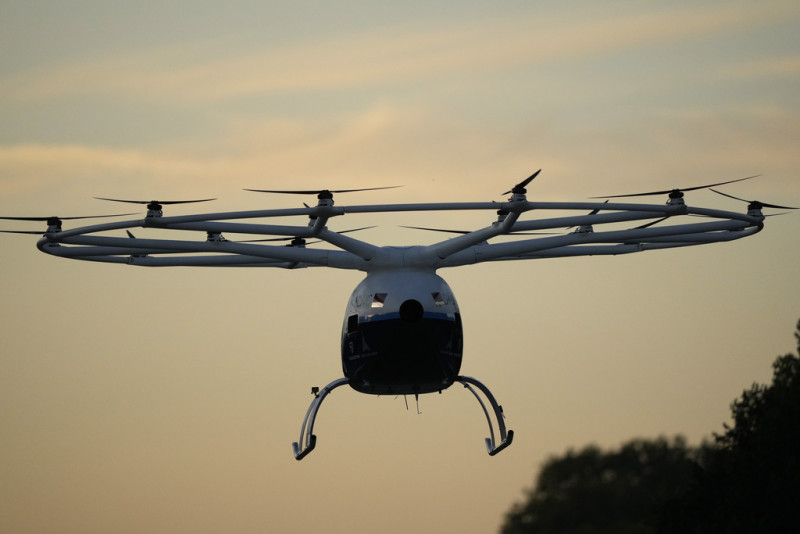Many hoped the first flying taxis would appear at the Paris Olympics, but hopes were dashed when investment began to collapse.
A major European innovation that would be presented at the Paris Olympics in 2024 was supposed to be an electric flying taxi service.
Germany’s Volocopter has promised to have its electric two-seater aircraft ready, the VoloCity, to transport passengers across the city. But this never happened.
Although the opportunity to present this important innovation at the Olympics was missed, much to the chagrin of many, behind the scenes the issue was much bigger as Volocopter was urgently trying to to raise new investments to maintain the business.
Talks to borrow 100 million euros from the government failed last April. Now, hopes are pinned on China’s Geely, which is in talks to acquire an 85 percent stake in Volocopter in exchange for $95 million in funding, according to a Bloomberg report. The deal, however, could mean that any future production will be moved to China.
According to the BBC, Volocopter is one of dozens of companies around the world developing an electric vertical takeoff and landing (EVTOL) aircraft. Their machines promise the agility of a helicopter, but without the cost, noise and emissions.
But faced with the huge costs of getting such new aircraft approved by regulators and then building up manufacturing capacity, some investors have backed off.
Lilium’s aircraft it was an innovative project and highly attractive, with the company claiming to have orders and memorandums of understanding for 780 jets from around the world. Construction of the first full-size jets had begun and testing was due to begin in early 2025. At the Farnborough Airshow in July, Lilium COO Sebastian Borel sounded confident.
“We’re definitely spending cash,” he told the BBC. “But this is a good sign, because it means we are producing the aircraft. We will have three aircraft in production by the end of the year and they have also raised 1.5 billion euros,” he said. But then the money ran out.
Lilium was trying to get a 100 million euro loan from the German development bank, KfW. However, this required guarantees from national and state governments, which never materialized.
In early November, the company placed its main operating activities in insolvency proceedings and its shares were delisted from the Nasdaq stock exchange.
For now, work on the new aircraft continues as the company works with restructuring experts to sell the business or bring in new investment. However, starting production of the new e-jet seems more difficult than ever.
The leading UK player in the eVTOL market is Vertical Aerospace. The Bristol-based company was founded in 2016 by entrepreneur Stephen Fitzpatrick, who also founded OVO Energy. The VX4’s impressive design includes eight large propellers mounted on thin aircraft-style wings for lift. Mr Fitzpatrick has made ambitious claims about the aircraft, saying it would be “100 times” safer and quieter than a helicopter, for 20% of the cost.
The company has made progress. After completing a remote-controlled test program, it began pilot testing earlier this year. However, there have been significant setbacks to the program with the result that in August last year a remotely piloted prototype was badly damaged when it crashed during tests at Cotswold Airport after a propeller blade fell off. In May, one of its key partners, engineering giant Rolls Royce, pulled out of a deal to supply electric motors for the aircraft.
Ambitions, however, remain high. Vertical Aerospace says it will deliver 150 aircraft to customers by the end of the decade. By then, he also expects to be able to produce 200 aircraft per year.
However, financial pressures have intensified. Mr Fitzpatrick invested an additional $25 million in the company in March. However, another $25 million, due in August if no alternative investment is found, has not been paid. As of September, Vertical had $57.4 million on hand — but expects to spend nearly double that next year.
Hopes now rest on a deal with him American financier Jason Mudrickwho is already a major creditor through his company Mudrick Capital Management. He offered to invest $75 million in the business – and warned Vertical’s board that rejecting his plan would inevitably lead to insolvency proceedings. But the move was blocked by Mr Fitzpatrick, who if given the go-ahead would lose control of the company he founded.
Sources close to the talks insist a deal is now very close. The company believes that if a deal can be done, it will unlock further fundraising opportunities.
Amidst the turmoil, a European project is well on its way, says Bjorn Fehrm, who has a background in aeronautical engineering and pilots fighter jets for the Swedish Air Force. He now works for aerospace consultancy Leeham. As he says the EVTOL project underway at Airbus is likely to survive.
It’s about CityAirbus NextGen, a four-seater aircraft that has eight propellers and a range of 80 km. Once the aircraft are built, the next challenge will be whether there is a profitable market for them.
The first routes are likely to be between airports and city centres. But the question that arises is whether they will be profitable.
“The biggest issue in terms of running costs is the pilot and the batteries. You have to change the batteries a few times a year,” points out Bjorn Fehrm.
Source :Skai
I am Terrance Carlson, author at News Bulletin 247. I mostly cover technology news and I have been working in this field for a long time. I have a lot of experience and I am highly knowledgeable in this area. I am a very reliable source of information and I always make sure to provide accurate news to my readers.











